
Appearing before the Senate Committee on Marine Transport to defend the ministry’s budget proposal for 2017 in February of the same year, the Minister of Transportation, Mr. Rotimi Amaechi told the senators that the dredging of River Niger had been completed and attention would be shifted to the dredging of River Benue. He was also quick to add that the all-important river would need constant maintenance work to allow for free flow of goods across the country. The assertion by Amaechi corroborates the account of his predecessor, Alhaji Idris Umar who, during the last administration, submitted that the River Niger had been completed and opened for navigation. However, few weeks after the submission at the senate, the current minister flagged off the maintenance dredging of the same river.
The maintenance dredging which was to be executed by the National Inland Waterways Authority (NIWA) was put at 100 million naira. Amaechi had said that the project would be saving the country some 24 billion naira that could be channelled into other infrastructural projects. According to the then Managing Director/CEO of NIWA who is now the Secretary to Government of the Federation, Boss Mustapha, the dredging, which was to ensure smooth navigation of vessels and barges, would cover Ajaokuta to Onitsha. It was a commendable development to see a government agency taking the lead in providing what ordinarily would have been another contract for private sector and probably a means for embezzlement. It is however important to establish that maintenance dredging is not the same as capital dredging. Maintenance dredging is more or less a routine to ensure uninterrupted navigability of the river channel and to prevent the river from deteriorating that would require another capital dredging.
Sadly, nearly one year after the inauguration of the maintenance dredging, no update has been provided on the project. In other words, we fear that another 100 million has gone into oblivion unaccounted. Much as we are bothered about the wasteful culture in the country and the fact that nothing seems to happen after every wasteful misadventure, it is more painful that in the end the industry is actually the biggest loser. The failure of successive administrations to dredge the river in time has contributed to the impassability of the river. The importance of the river, which is longest and biggest river in Nigeria, to the maritime industry and the economic growth of Nigeria cannot be overemphasised. It is astonishing that the move to dredge the river was conceived by the British colonialists who could not execute the project before independence. Yet its dredging has remained a recurring project for every administration since independence. An initial contract was approved in 1998 to be funded through the Petroleum Trust Fund (PTF) but nothing was done because the initial contract did not take into consideration Environmental Impact Assessment (EIA). The Obasanjo administration also made attempt at dredging the river to no avail. To show the serious of the administration in its early days, the then Minister of Transport, Isa Yuguda said “Both rivers Niger and Benue are fast drying up because they are almost silted and studies have shown that they may completely dry up in the next 20 to 25 years if concerted efforts are not made to safeguard them.” Eventually, the multi-billion naira contract for the dredging of the river was cancelled.
But the Yara’dua administration came, revisited and bequeathed it to the Jonathan’s administration. The government in 2011 approved the Lower River Niger Dredging Project from Warri, in Delta State, to Baro, in Niger State, to four contractors, including Fung Tai Eng Company Nigeria Limited, Dredging International Service Nigeria Limited, Van Oord Nigeria Limited and Williams Lloyds Technology Company Limited. President Jonathan at the maiden edition of the International Conference and Exhibition, ICE, organised by the National Inland Waterways Authority, NIWA in August 2014 and represented by the Minister of Transport, Idris Umar, told the gathering that his administration had dredged the River Niger urging investors to make use of the river. However, stakeholders have often complained of the impassable state of the river in recent times. This bring to fore the importance of maintenance dredging, because it is the only way to ensure continuous navigability of the river.
At the flag off ceremony of the maintenance dredging, the minister stated that NIWA possesses the capacity to carry out the project. The truth in that assertion is still yet to be seen. Rather, what we have seen is 100million naira that has probably been spent without commensurate result. If there is any progress recorded since the inauguration that is not visible to the general public, perhaps it will be appropriate for NIWA to openly enlighten us. We cannot continue to make the dredging of the River Niger a pipe to drain the national purse.
Copyright Ships & Ports Ltd. Permission to use quotations from this article is granted subject to appropriate credit given to www.shipsandports.com.ng as the source.